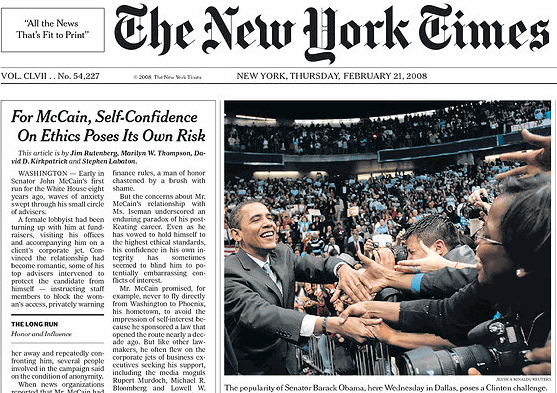Clinton the Stronger Candidate?
Chris Cillizza examines Hillary Clinton’s claims that her demonstrated ability to appeal to white, working class voters makes her the better candidate in the Fall. Examining the state-by-state races, he figures only 14 states will truly be competitive.
A glance at these 14 states — and the polling to date in each — suggests that Clinton is clearly the stronger Democrat in three: Florida, Ohio and Pennsylvania. That trio of states, which includes the two central battlegrounds in the 2000 and 2004 presidential contests, have 68 electoral votes between them.
Obama would seem to have a discernible edge over Clinton in six states: Colorado, Iowa, Minnesota, Oregon, Virginia and Washington. These states have a total of 57 electoral votes.
Neither Clinton nor Obama can make an air-tight case that she (or he) would be stronger against McCain in Maine (4 electoral votes), Michigan (17), Missouri (11), New Hampshire (4) and New Mexico (5).
Taken as a whole, Clinton’s argument that she is the stronger potential general election candidate against McCain is true — to a point. She is stronger — although not by much — if the playing field in 2008 is a mirror image of the battlegrounds of 2004 and 2000. Clinton, at the moment, is more strongly positioned to win in three states — Florida, Pennsylvania and Ohio — that have decided the winner in the last two presidential contests.
One of Cillizza’s commenters actually looks at the numbers, as currently reported by RealClearPolitics, and breaks down the state-by-state numbers. The bottom line is in contrast with Cillizza’s guess:
Clinton advantage states: AR, FL, MO, NH, OH, PA, WV (94 total)
Obama advantage states: CO, IA, MN, NV, NM, NC, ND, OR, SC, VA, WA, WI (103 total)
Still, given that Clinton is more likely to win traditional large battleground states of Florida, Missouri, Ohio, and Pennsylvania whereas Obama is looking to pick off a handful of traditional Republican states trending purple, I’d say Clinton has the slight advantage.
Cillizza concludes,
But that argument only holds if you believe two things: First, that the playing field will be essentially unchanged between 2000/2004 and 2008 and, second, that current polling is an accurate predictor of what things will look like in November.
He’s dubious of both those assumptions, as is Bernard Finel, who believes, Obama is “the better candidate and he’s likely strong enough to win. Her marginal superiority on the latter measure does not overcome his dramatic advantage in the former.”
The contrary view is expressed by Dodd Harris who, as noted previously, argued last night on OTB Radio that the Democrats will have buyers’ remorse this Fall, wishing they’d nominated Hillary Clinton rather than upstart Barack Obama. He’s of the belief that Obama’s tendency to commit gaffes on the campaign trail is likely to intensify, the his vague “hope” and “change” appeals will wear thin, and that his dismissal of all criticism as illegitimate and (via surrogates) racist will hurt him in November.
My view of Obama’s candidacy, from the beginning, has been that he started at the apex of his popularity and that it could only go down through prolonged exposure. I still believe that’s the case. He began as a tabula rasa onto whom people could project their fantasies of a candidate; he’s revealing himself to be a mere mortal.
Still, he’s ultimately the better candidate. While Obama has his problems, half the country starts out strongly disliking Clinton as a human being. Given that this sentiment has been hard won in sixteen years in the public eye, I’m confident that it will only be hardened by several more months of exposure. By contrast, even those who wouldn’t dream of voting for Obama rather like him.
The Democratic nominee has every advantage in this contest but it’s quite conceivable that John McCain could nonetheless win. He vastly outpolls the generic Republican ballot and he’s got a lot of strengths that will appeal to moderates.
Obviously, if the Democrats lose again, they’ll wish they’d nominated someone else. That’ll hardly be evidence, though, that Clinton would have done any better. I tend to agree with Finel here:
Clinton may have a marginally better chance to eke out a 270-268 victory. Obama undeniably has a much better chance to win with 350+ electoral votes.
Obama’s “hope” and “change” bubble could burst or he can continue to inspire. Clinton, by contrast, is more likely to win a nasty slugfest. The end result of that victory, though, would be another four years of partisan rancor at DEFCON 2. McCain and Obama each have the potential, at least, of ratcheting that down a couple notches.





Clinton having a better chance to eke out a 270-268 win is right. I think Obama’s chance to put together 350+ EV win are about the same as his chance to be on the wrong side of a 350+ EV election.
Look at the proposed “advantage states”.
Clinton advantage states: AR, FL, MO, NH, OH, PA, WV (94 total)
PA (21 EV) was in the dem column in 2000 and 2004 (and presumably starts there for 2008 to stay or be moved as the election unfolds).
NH (4 EV) bounces back and forth by small margins. The state being under total democratic control with the logical consequence of a ballooning state tax and debt is more likely to influence the state than the democratic candidates name,
AR (6EV) is obvious. Arkansas was the only state that actually had a majority who want Bill Clinton to be president in 1992.
MO (11EV) is the bell weather state. If Clinton really has an advantage with this states population, that gives her an advantage in a lot of places.
WV (5EV) is not likely to actually go to a liberal democrat in November. But it is also far from a lock for a republican.
The big prizes are OH (20 EV) and Fl (27 EV). If she could really take those out of the GOP hands (and hold on to PA), then she wins. Its that simple.
So using the 2000/2004 as a base line and assuming these are the states she can really make competitive, she is looking to take 69 EV out of the GOP column, hold 21 EV in the dem column and pull 4 EV that go back and forth to the dems.
Obama advantage states: CO, IA, MN, NV, NM, NC, ND, OR, SC, VA, WA, WI (103 total)
MN (9 EV), OR (7EV), WI (10 EV) and WA (11 EV) are in the dem column for 2000/2004. You can make a case that MN might flip (especially with Pawlenty in the number 2 slot), but OR and WA aren’t likely to flip.
CO (9 EV), NV (5 EV), NC (15 EV), ND (3 EV), SC (8 EV) and VA (13 EV) are in the GOP column for 2000/2004. CO and VA have been trending towards the dems and could very well flip.
IA (7EV) and NM (5 EV) have both bounced around in 2000/2004 and could go either way.
So Obama with the same assumptions as above would take 53 EV from the GOP column, 37 EV that are in the dem column and put in play 12 EV that go back and forth to the dems.
So Hillary takes 61 GOP EV vs Obama taking 53 GOP EV. Obama is in smaller packets vs Clinton has 47 EV resting on just two states. Diversify or concentrate. There are advantages to both approaches.
Hillary keeps 21 vs Obama 37 EV in the dem column. But what isn’t stated is the colliery. Does Obama put PA (21 EV) in play for the GOP. If he does and the 53 GOP EV split 50-50, then he is a net wash (and likely loses). If on the other hand, Hillary puts the 37 EV in the dem column listed for Obama in play, then if those go 50-50 and she splits Ohio/Florida, then she is about a net wash (and likely loses).
Bottom line is that the GOP is in a better position than the political tea leaves would say they have any right to be, but are still facing an up hill battle.
James, I agree with your reasoning that Obama is the better candidate. However, I think that both of the two Democratic candidates are weaker than the party should have been able to muster and buyer’s remorse in the fall is pretty likely regardless of which of the two is nominated.
Like 2004 this election should be a lead pipe cinch for the Democrats, even more so since Bush is finishing his second term. They may figure out a way to throw the election yet.
Like this analysis – and I’ll run with it. I also agree that the democrats certainly picked one hell of a time to get all “historic” on us – it would have been a lot less stressful to just go with a safe “don’t rock the boat” win.
Hey! I think I managed to be both sexist AND racist!! 🙂
Thats right Kent. But remember, the democrats twofer sale of being able to be accused on being both sexist and racist by simply pointing out simple truths is running out.